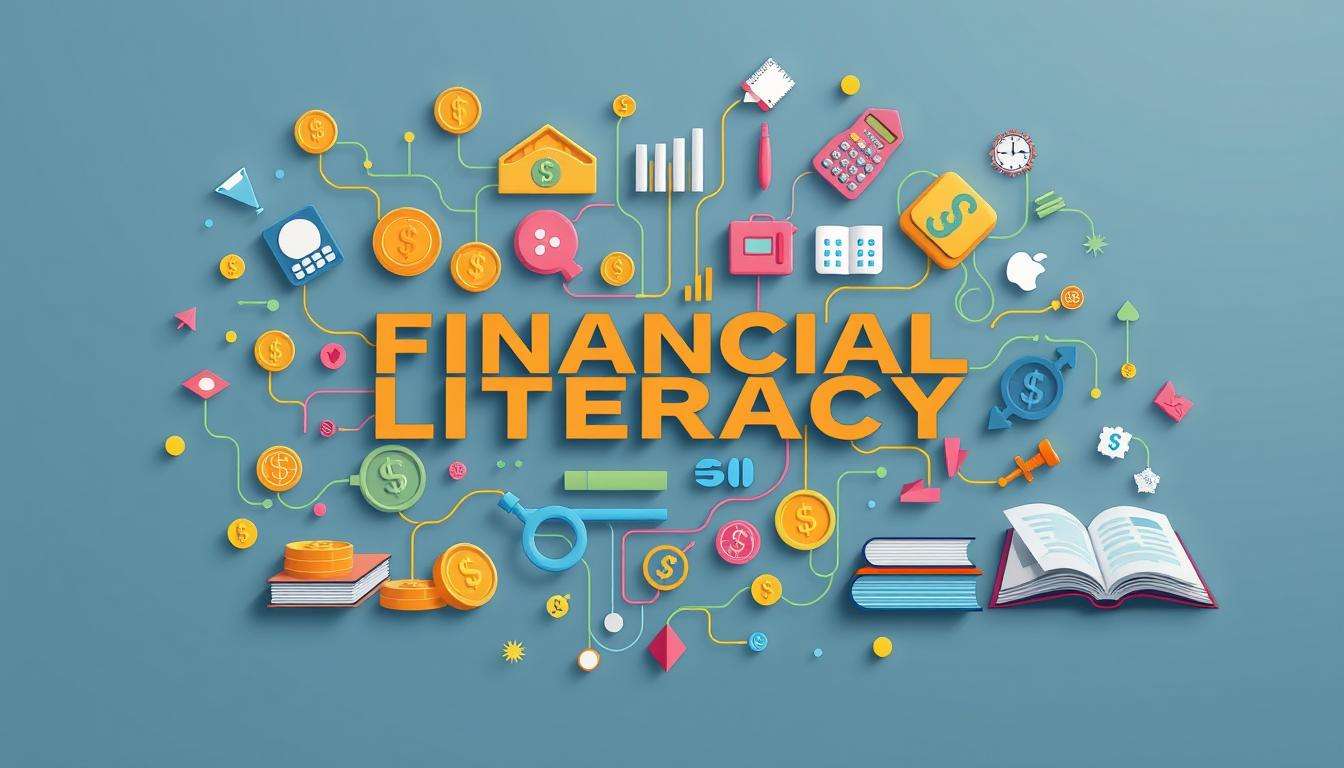Welcome to the journey of improving your financial literacy. This is a key step towards mastering money management and reaching your personal finance goals. Sadly, only about 48% of US adults have enough financial education.
You might be among the 79% of people aged 18 to 41 who look for financial info on social media. Or you might enjoy learning from podcasts and newsletters. With an average financial literacy score of 6.2 out of 10, there’s a lot of room for growth.
Learning about financial literacy helps you make smart choices about budgeting, saving, and investing. It’s also important to understand debt management, as it affects your credit score. For example, your payment history makes up 35% of your score, and the amount of debt is another 30%.
So, it’s crucial to work with trusted financial experts. They can help you navigate different financial situations and create a plan for success.
Key Takeaways
- Financial literacy is essential for informed decision-making and future planning.
- Nearly 80% of younger adults turn to social media for financial insights.
- Understanding budgeting is critical for tracking spending habits.
- Your payment history plays a major role in determining your credit score.
- Engaging with financial professionals can expand your financial knowledge.
- Only 39% of Americans have a reliable plan for retirement.
- Free resources like Khan Academy and Coursera can help enhance your financial education.
Understanding the Basics of Personal Finance
Learning the basics of personal finance can really help your financial journey. It’s about knowing key concepts like budgeting, saving, and managing debt. These basics help you make smart financial choices and stay stable.
Key Concepts to Master
Budgeting is key to managing your money well. A good budget lets you plan for needs like housing and food. It also helps you save for the future.
There are many budgeting strategies to try. The 50-20-30 rule is one example. It suggests using 50% for needs, 30% for wants, and 20% for savings. This can help you spend wisely and save more.
Importance of Spending Awareness
Knowing how you spend your money is vital. Tracking your income and expenses helps you see patterns. This knowledge can help you change spending habits that lead to debt.
Being financially literate is also important. It helps you manage debt well. Tools like CreditWise from Capital One let you check your credit without hurting your score. Learning these basics improves your ability to save and secure your financial future.
Creating a Budget for Financial Success
Creating a budget is key to reaching your financial goals. It helps you manage your money better. Knowing different budgeting methods can help you find the right one for you.
Different Budgeting Methods to Consider
There are many budgeting methods out there. Each one is good for different financial situations and preferences. Here are a few common ones:
- The Envelope System: This method uses cash in envelopes for different expenses. It helps you stay aware of your spending.
- 50/30/20 Rule: This rule says to spend 50% on needs, 30% on wants, and 20% on savings and debt.
- Zero-Based Budgeting: Every dollar of your income is used for something. It’s great for keeping track of your money.
| Budgeting Method | Key Feature | Best For |
|---|---|---|
| The Envelope System | Cash-based spending | People who prefer physical currency |
| 50/30/20 Rule | Simplified allocation of funds | Those new to budgeting |
| Zero-Based Budgeting | Every dollar has a job | Individuals who want detailed oversight |
Tips for Staying on Track
Keeping to a budget takes commitment and flexibility. Here are some tips to help you stay on track:
- Check your budget often to find ways to improve.
- Use budgeting apps for easy tracking and to make budgeting simpler.
- Update your budget when your life changes or when you have new financial goals.
- Join personal finance groups for support and to stay accountable.

100% of people think budgeting is essential for long-term financial success. Using effective budgeting methods can greatly improve your finances. Remember, staying committed to your budget increases your chances of reaching your financial goals.
Building Wealth through Saving and Investing
To build wealth, saving and investing are key. Knowing the different investment options helps you choose the right ones for your goals and how much risk you can take.
Types of Investment Options
There are many investment options to meet various financial needs and goals. Here’s a look at some common ones:
| Investment Type | Description | Risk Level | Potential Returns |
|---|---|---|---|
| Stocks | Ownership in a company, with potential for high returns. | High | Variable |
| Bonds | Loans to entities like governments or corporations, usually offering fixed interest. | Low to Medium | Moderate |
| Mutual Funds | Pools of money from many investors to buy various stocks/bonds. | Medium | Variable |
| Real Estate | Investing in property, which can appreciate over time. | Medium to High | Variable |
| Retirement Accounts | Tax-advantaged accounts for retirement savings. | Varies | Long-term growth potential |
Wealth building means understanding your options and spreading out your investments. This way, you can reduce risks and increase potential gains. Each investment has its own features, helping you choose based on your risk level and goals.
Consulting a Financial Advisor
Getting advice from a financial advisor can really help you grow your wealth. A good advisor will tailor strategies to fit your financial situation and goals. Look for advisors with the right credentials, experience, and expertise.
Advisors can guide you through the investment world. They offer insights on market trends, suggest investments, and help set financial goals. The right advisor helps you create wealth and plan for financial growth.

Establishing an Emergency Fund
Creating an emergency fund is key to financial security. It’s your safety net for unexpected costs like medical bills or car repairs. Aim for three to six months of living expenses to feel secure.
It’s hard to save with changing incomes or living paycheck to paycheck. Setting a savings goal can motivate you. Start with small amounts, like $5 to $100, to make it manageable.
Automating savings from your checking to savings is a smart move. Many employers offer direct deposit for this. Also, save any extra money, like tax refunds, to boost your fund.
Keep your emergency savings safe and only use it for emergencies. Avoid spending more or taking on debt. Once your fund is full, consider investing it for better returns.

| Saving Method | Benefits | Considerations |
|---|---|---|
| Automatic Transfers | Consistency in savings; no need to think about it. | Avoids the temptation to spend the money. |
| Tax Refund Savings | Provides a lump sum to kickstart your fund. | Requires discipline to set aside funds immediately. |
| Employer Contributions | Automated savings with potential for employer matching. | May limit access to funds until certain criteria are met. |
| Incremental Goals | Achievable targets keep you motivated. | May require adjustments based on changing finances. |
Building your emergency fund prepares you for life’s surprises. It ensures you’re ready for whatever comes your way.
Managing Your Debt Responsibly
Knowing how to handle your debt is key to financial stability. There are many types of debt, like credit card balances, student loans, and mortgages. Each has its own terms and interest rates that impact your finances.
Good debt, like education loans, often has lower interest rates. It can even increase your net worth. On the other hand, bad debt, with high-interest rates on things that lose value, can hurt your finances a lot.
Types of Debt and Their Impact
Each debt type affects your credit score in different ways. Payment history is 35% of your score. Keeping your credit use under 30% helps avoid score drops.
Also, a debt-to-income ratio under 35% keeps your credit good. Avoid opening many credit accounts at once to prevent score drops. For more on managing debt, check out this resource on debt management.
Strategies for Prioritizing Debt Repayment
Effective strategies are crucial for paying off debt. The avalanche method targets high-interest debts first to save on interest. The snowball method focuses on smaller debts for a quick win.
Consolidating debt simplifies payments but may not speed up debt elimination. Always keep an emergency fund while focusing on debt repayment. This way, you can handle unexpected costs without adding more debt.
FAQ
What is financial literacy and why is it important?
Financial literacy means understanding money matters. It helps you manage your finances well. This includes making budgets, saving for emergencies, and setting financial goals.
How can I start budgeting effectively?
Pick a budgeting method that fits you, like the 50/30/20 rule. Track your money in and out regularly. Adjust your budget as your finances change.
What are different ways to save money?
Save by setting up automatic transfers to savings. Use high-yield savings accounts. Cut back on spending on fun stuff. Also, save for emergencies.
What types of investments should I consider?
Look into stocks, bonds, mutual funds, and real estate. Also, think about retirement accounts like 401(k)s or IRAs. Each has its own risks and rewards. Diversify to fit your goals and comfort level.
How can I manage and pay off my debt more effectively?
First, know what debts you have and their interest rates. Use the debt snowball or avalanche method. This means paying off smaller debts first or those with higher interest rates.
How much should I have in my emergency fund?
Aim for three to six months’ living expenses in your emergency fund. This helps with unexpected costs, like medical bills or losing your job, without getting into more debt.
Should I consult a financial advisor? What can they offer?
A financial advisor can be very helpful. They give personalized advice, help with investments, and create a financial plan for you. They make complex money topics easier to understand.
What is the best method for tracking my budget?
Budgeting apps or software linked to your bank accounts can help. Also, set aside time for regular budget checks. This helps you stay on track, see where your money goes, and make needed changes.
Source Links
- https://www.athene.com/smart-strategies/6-ways-to-improve-your-financial-literacy.html
- https://college.harvard.edu/guides/financial-literacy
- https://www.success.com/financial-literacy-mastering-money-management/
- https://www.investopedia.com/guide-to-financial-literacy-4800530
- https://www.capitalone.com/learn-grow/money-management/financial-literacy/
- https://www.financialliteracy101.org/financial-literacy/index.cfm?
- https://www.vistabank.com/resources/financial-literacy-resource-center/budgeting-for-beginners/
- https://www.usa.gov/features/budgeting-to-meet-financial-goals
- https://www.investopedia.com/financial-edge/1109/6-reasons-why-you-need-a-budget.aspx
- https://www.uwyo.edu/uwe/programs/money/saving-investing/index.html
- https://scc.virginia.gov/getattachment/9d25dae4-149b-4e40-abd6-5b1e764fefec/BuildWealth.pdf
- https://www.consumerfinance.gov/an-essential-guide-to-building-an-emergency-fund/
- https://www.securian.com/insights-tools/articles/5-steps-to-building-an-emergency-fund.html
- https://www.wellsfargo.com/goals-credit/smarter-credit/manage-your-debt/tips-for-managing-debt/
- https://www.ameriprise.com/financial-goals-priorities/personal-finance/effective-debt-management










